News on forced labour
June 2015
-
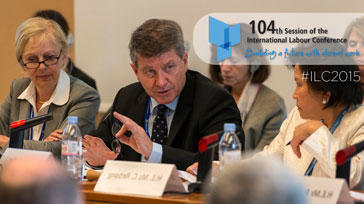
“There is no easy fix” to the migration crisis
05 June 2015
ILO Deputy-Director Sandra Polaski at ILC Migration side event: “We must focus on systems of governance that provide regular and safe migration to meet migrants’ rights and labour market needs.
-

Niger labour minister signs up to stop modern slavery
05 June 2015
Niger has ratified the Protocol of 2014 to the Forced Labour Convention, 1930. The Protocol brings the existing convention into the modern era, with new provisions on prevention, protection and victims’ access to remedies.
-
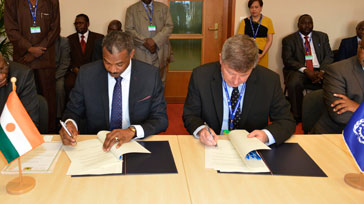
Niger signs up to end modern slavery
05 June 2015
Niger has ratified the 2014 Protocol to the 1930 ILO Forced Labour Convention, as part of a renewed global effort to eradicate modern slavery. The Protocol, a legally binding instrument, brings the existing convention into the modern era, with new provisions on prevention, protection and victims’ access to remedies.
-
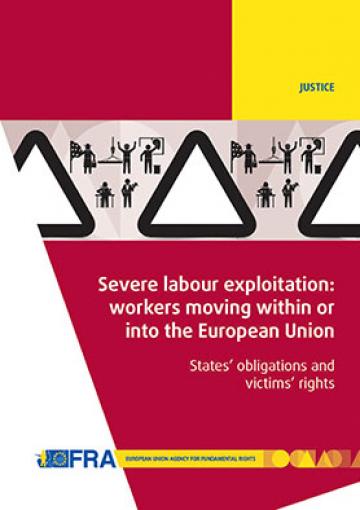
Severe labour exploitation in the EU
FRA will launch the report from its ‘Severe labour exploitation in the EU’ project at a high-level event at the Council of the EU on 2 June in Brussels.
-
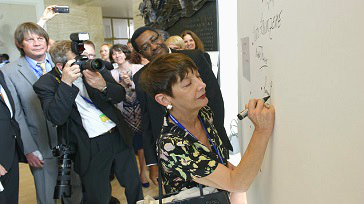
Signing up to end modern slavery
01 June 2015
ILO Director-General, Guy Ryder, was joined by delegates to the International Labour Conference, in signing a signature panel symbolizing support for the 50 for Freedom campaign to end modern slavery. The campaign has the goal of encouraging 50 member States to ratify, by 2018, the Protocol to the Forced Labour Convention.
-

Signing up to end modern slavery
01 June 2015
ILO Director-General, Guy Ryder, was joined by delegates to the International Labour Conference, in signing a signature panel symbolizing support for the 50 for Freedom campaign to end modern slavery. The campaign has the goal of encouraging 50 member States to ratify, by 2018, the Protocol to the Forced Labour Convention. (Closed Captions available)
May 2015
-
Work in Freedom Programme Update
The Work in Freedom Update and UK Stakeholder Meeting is an annual event intended to brief UK stakeholders engaged in the fight against modern slavery on progress with the Work in Freedom Programme. It is also an opportunity for others to share latest developments or emerging evidence in the field. Work in Freedom is a five year, UK-funded initiative to combat trafficking of women in South Asia and the Middle East. The programme is delivered by the International Labour Organisation, the London School of Hygiene and Tropical Medicine and other global and local partners.
-
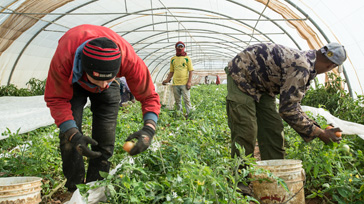
© ILO/Nadia Bseiso 2024
Informally employed Syrian refugees, working under harsh conditions, further strain Jordanian labour market
18 May 2015
The arrival of hundreds of thousands of Syrian refugees in neighbouring Jordan has increased unemployment in areas in which they are highly concentrated, and further strained the host country’s infrastructure, resources and public services. This has increased competition in some sectors and added to the informality of the labour market, a new joint report by the International Labour Organization (ILO) and Institute for Applied International Studies (Fafo) finds.
April 2015
-
Expert workshop "Measuring Modern Slavery"
The key objectives of these two days of consultation are to take stock of the current state of knowledge of tools and methodologies; to analyse the current limitations and challenges faced; to discuss the need for a unique operational definition of forced labour and for criteria for identifying modern slavery situations; and to identify partnerships and opportunities for further collaboration.
-
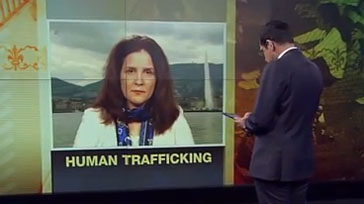
Counting the cost of forced labour
13 April 2015
An estimated 21 million people are in forced labour and generate around USD 150 billion of illicit profits every year, according to Beate Andrees, head of the ILO's Special Action Programme to Combat Forced Labour. In her interview on Al Jazeera's "Counting the Cost", Andrees said more needs to be done to address the root causes of forced labour and human trafficking through greater political commitment and social movements.